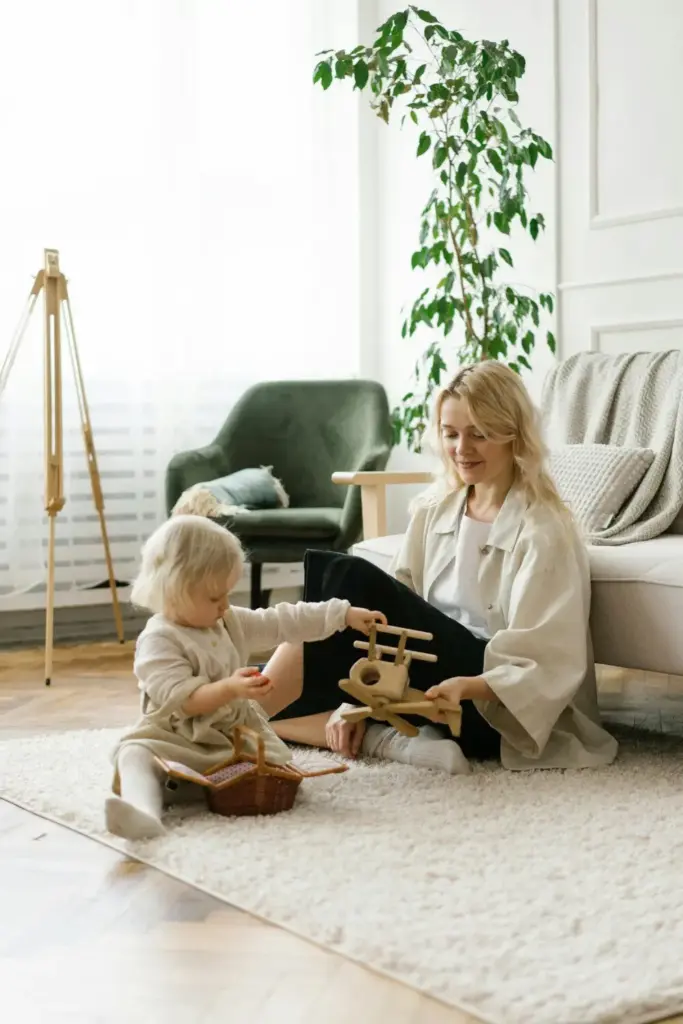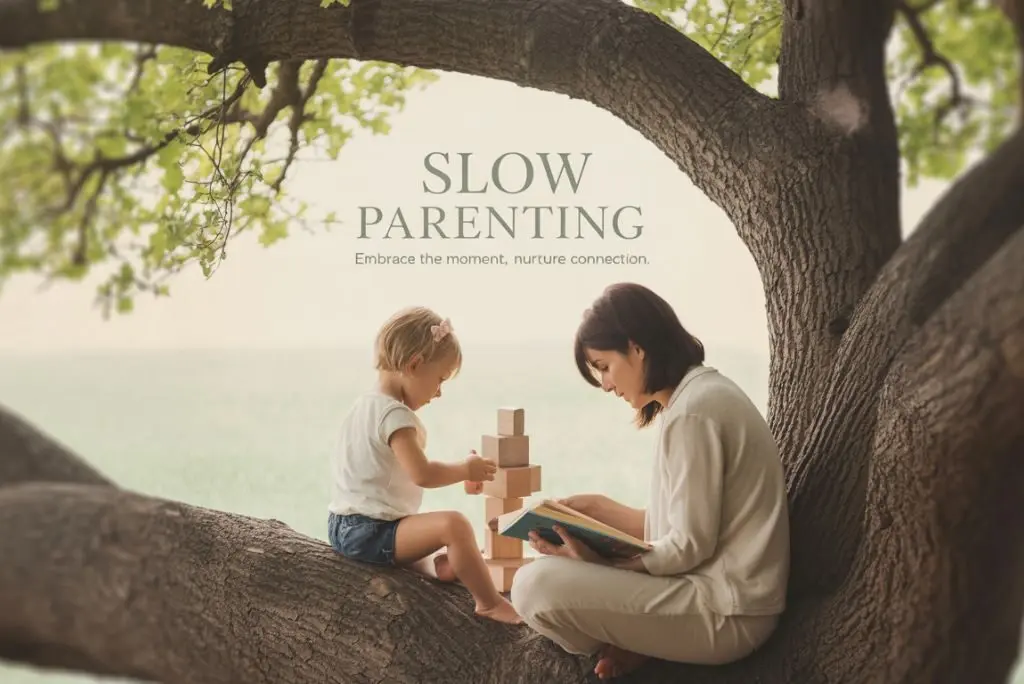Modern parenting can be really tough. Parents have to balance work, home chores, and making sure their kids are happy and healthy. It feels like they’re always juggling too many things at once.
The need to be perfect can be overwhelming. This makes it hard to enjoy the journey of raising kids.
Parenting with Purpose and Peace
Finding peace in parenting starts with letting go of perfection and choosing to show up with intention. Discover how putting presence over perfection can transform your motherhood journey. Add more mindful habits with daily presence practices and explore practical tips to be there when it matters most. These small shifts help build a calmer, more connected home.

Being a mindful parent means being present in the moment. It’s about letting go of distractions and really connecting with your child. It’s about finding peace in the chaos and creating a safe space for your child to grow.
By using mindful parenting, you can lower stress and anxiety. You can also improve your bond with your child. And you can make your home a more peaceful place.
Key Takeaways
- Mindful parenting helps reduce stress and anxiety.
- Being present in the moment improves your relationship with your child.
- Simple parenting tips can create a more peaceful home environment.
- Mindful parenting practices promote a nurturing environment for your child.
- Embracing mindful parenting can lead to a more harmonious family life.
The Modern Parenting Challenge
Parenting today is tough due to distractions, pressures, and the risk of losing touch with what’s important. Parents face many challenges that test their patience, presence, and peace.

The Distraction Epidemic in Family Life
Notifications, social media, and emails can distract parents. Being present with kids means more than just being there. It’s about giving them our full attention. In this busy world, present parenting is crucial.
The Pressure of Perfect Parenting in the Social Media Age
Social media shows the best of other families, setting high standards. This can make parents feel like they’re not good enough. But conscious parenting is about being aware of our actions, not being perfect.
The Cost of Autopilot Parenting
Parenting on autopilot means missing chances to connect and grow. Not being fully present can harm our kids’ emotional and psychological health. Being mindful and engaged helps create a supportive family environment, key to positive parenting.
Knowing these challenges helps us be more mindful and connected parents. By facing distractions, pressures, and pitfalls, we can adopt a more present, conscious, and positive parenting style.
Understanding What It Means to Parent With Presence
Parenting with presence means being fully there for your child. It’s about being mindful and connecting deeply. This way, parents and kids build a strong bond.
It’s not just about being with your child. It’s about being fully in the moment. This makes a big difference in how your child grows and in your bond.

The Mindfulness Connection in Parent-Child Relationships
Mindfulness is key in parent-child relationships. It helps parents respond better to their kids. This leads to a more peaceful home.
Parent education teaches parents to be more mindful. They learn to stay in the moment and focus on their kids.
The Difference Between Being Present and Being Perfect
Being present is different from trying to be perfect. Being perfect is hard, but being present is doable. It’s about being in the moment and meeting your child’s needs.
Being present makes parents more supportive. It’s a way to build a real and loving relationship with your child.
How Children Experience Parental Presence
Children feel safe and understood when parents are present. This helps them manage their emotions and grow strong. When parents are there, kids feel free to share their feelings, deepening their connection.
The effect of parental presence on kids shows why mindful parenting matters. Being present helps kids grow and thrive with the support of their parents.
The Science Behind Mindful Parenting
Understanding mindful parenting can make parents more compassionate and connected with their kids. It’s about being fully present and engaged with your child. This approach is backed by research in psychology, neuroscience, and education.
Brain Development and Secure Attachment
Mindful parenting is key to a strong bond between parents and children. This bond is crucial for a child’s emotional and social growth. Studies show that mindful parents help their kids develop a secure attachment style.
“Being mindful makes us more in tune with our children’s needs,” says Dr. Daniel Siegel, a UCLA professor. This connection is vital for a child’s brain development, especially in emotional regulation.
Stress Reduction Benefits for Parents and Children
Mindful parenting benefits both parents and kids. It helps parents stay calm and aware, which is good for everyone. When parents are less stressed, they’re more patient and loving.
A study in the Journal of Child and Family Studies showed mindful parenting lowers stress in parents. It also improves relationships between parents and kids. This leads to better behavior in children.
Research on Long-Term Outcomes of Present Parenting
Research on mindful parenting shows great results. Kids of mindful parents tend to have better social skills and emotional control. They also do well in school and are less anxious or depressed.
A study tracked kids from mindful parenting programs. They found these kids did better in social skills and emotional well-being. This highlights the lasting benefits of mindful parenting.
Creating Daily Rituals for Connected Parenting
Adding daily rituals to your routine can make your family life more connected. These rituals bring stability and predictability. They are comforting for kids and strengthen the bond between parents and children.
Morning Mindfulness Practices for Families
Starting the day with mindfulness sets a positive tone for your family. Simple activities like deep breathing, sharing gratitude, or a short meditation can center everyone. It helps everyone start the day feeling more connected.
Mindfulness in the morning doesn’t need to take a lot of time. Just a few minutes can change how the day goes.
Bedtime Bonding Routines That Deepen Connection
Bedtime is a great time to bond with your kids. Reading together, telling stories, or a relaxing bath can create lasting memories. These activities strengthen your relationship.
These bedtime bonding routines help you wind down and connect deeply. You can talk about your day and plans for tomorrow.
Meaningful Mealtime Conversations Without Devices
Mealtimes are perfect for connecting through conversation. By not using devices, families can bond more and enjoy meals better.
For device-free mealtime conversations, try using conversation starters. Share your day’s stories and listen actively to each other.
Micro-Moments of Connection Throughout the Day
Micro-moments of connection throughout the day are key. They can be as simple as a hug, a kind word, or laughter. Being mindful of these moments can greatly improve your parenting journey.
These small moments can make a big difference. They help create a more loving and connected family environment.
Navigating Difficult Moments with Conscious Awareness
Conscious parenting isn’t about avoiding challenges. It’s about facing them with awareness and compassion. As parents, we often find ourselves in situations that test our patience, understanding, and ability to remain present.
The Pause Practice for Parental Triggers
One of the most effective mindful parenting techniques is the pause practice. When we feel triggered or about to react impulsively, pausing allows us to take a step back, breathe, and choose a more thoughtful response.
This simple act can significantly reduce stress and improve our interactions with our children. By incorporating the pause practice into our daily lives, we model emotional regulation and show our children how to handle difficult emotions constructively.
Modeling Emotional Regulation in Real Time
Children learn from what they see, making it crucial for parents to model the behavior they wish to instill. When we regulate our emotions and respond thoughtfully, we teach our children to do the same.
For instance, during a heated moment, instead of lashing out, a parent can say, “I’m feeling overwhelmed right now. Let me take a moment to calm down.” This approach not only diffuses tension but also demonstrates a healthy way to manage emotions.
Turning Conflicts into Connection Opportunities
Conflicts are inevitable in any relationship, including the parent-child relationship. However, with conscious parenting, we can turn these conflicts into opportunities for deeper connection and understanding.
| Conflict Resolution Step | Description | Benefit |
|---|---|---|
| Stay Calm | Manage your emotions to respond thoughtfully. | Reduces escalation |
| Listen Actively | Give your full attention to your child’s perspective. | Enhances understanding |
| Empathize | Acknowledge your child’s feelings. | Builds trust and connection |
By adopting these parenting techniques and embracing mindful parenting practices, we can navigate difficult moments with greater ease. We turn challenges into opportunities for growth and deeper connection with our children.
Digital Detox: Reclaiming Family Time in a Tech-Saturated World
Technology is everywhere in our lives today. This makes us rethink how we spend time together as families. Taking a digital detox can help us get back to quality family time.
Setting Healthy Boundaries with Technology
It’s key to set limits on technology use. This helps keep a balance between screen time and family moments. Making rules and sticking to them is important.
- Make times when no tech is allowed (like during meals or before bed)
- Limit how much screen time everyone gets
- Encourage going outside and playing
Quality vs. Quantity: Making the Most of Family Time
It’s not just about how long we’re together. It’s about the quality of that time. Doing things that mean something and talking without devices can really bring us closer.
| Activity | Benefits |
|---|---|
| Family game nights | Promotes teamwork, communication, and healthy competition |
| Cooking together | Teaches culinary skills, encourages collaboration, and creates memories |
| Outdoor adventures | Fosters a sense of adventure, promotes physical activity, and enhances family bonding |
Tech-Free Zones and Times in Your Home
Having tech-free areas and times can reduce distractions. It helps us focus on each other more.
Try making your dining table or living room tech-free. This can lead to better conversations and stronger family ties.
Mindful Media Consumption as a Family
Being mindful of what we watch or read is important. Choose content that fits your family’s values.
Being thoughtful about our tech use can lead to a better family life. It’s good for our kids and for us as parents too.
Self-Care as the Foundation of Present Parenting
Starting the journey to mindful parenting means taking care of ourselves first. As parents, we often forget our own wellbeing is key to being present and effective. This is crucial for our role in parenting.
Why Your Wellbeing Matters to Your Children
When we focus on self-care, we’re not being selfish. We’re creating a healthier, more positive home for our family. Children learn from what they see. Seeing us take care of ourselves encourages them to do the same.
A well-cared-for parent is more patient and understanding. They can better support their children emotionally.
Practical Self-Care for Busy Parents
Finding time for self-care can seem hard, but it’s not impossible. Here are some easy tips for busy parents:
- Start small: Even a few minutes of deep breathing or a short walk can make a difference.
- Schedule it in: Treat self-care as a non-negotiable part of your daily or weekly routine.
- Combine activities: Listen to a podcast or audiobook while doing chores or driving.
- Ask for help: Don’t be afraid to ask your partner, family, or friends to watch the kids while you take some time for yourself.
Overcoming Parent Guilt and Perfectionism
Many parents feel guilty or inadequate, making self-care hard. It’s important to see self-care as a must for good parenting. Letting go of perfection and embracing our humanity helps us focus on our wellbeing.
Modeling Self-Compassion for Your Children
Showing kindness to ourselves teaches our children to do the same. This helps them feel good about themselves and builds a supportive family. By being kind to ourselves, we show it’s okay to make mistakes and learn from them.
In conclusion, self-care is vital for mindful parenting. By taking care of ourselves, we become better parents. We’re more present, patient, and supportive, creating a loving family environment.
Building a Support System for Mindful Parenting
Mindful parenting is not a solo journey. It’s about building a community that supports you. As parents, we often seek guidance and reassurance. A strong support system can provide the encouragement and resources needed.
Finding Your Parenting Community
Connecting with other parents who share similar values and parenting styles is beneficial. Join local parenting groups or online forums focused on positive parenting. These communities offer valuable advice, emotional support, and a sense of belonging.
- Local parenting meetups
- Online forums and social media groups
- Parenting workshops and classes
When and How to Ask for Help
Recognizing when you need help is a sign of strength, not weakness. You can consult with a parenting coach, seek advice from family and friends, or use parenting resources online. There are many ways to get the support you need.
Some key times to ask for help include:
- When you’re feeling overwhelmed or stressed
- If you’re facing a specific parenting challenge
- When you’re looking for new strategies or techniques
Resources for Continued Learning
Continuing your parent education is key to mindful parenting. There are many resources available, from books and podcasts to online courses and parenting blogs.
Some recommended resources include:
- Books on mindful parenting and child development
- Podcasts offering parenting advice and support
- Online courses on positive parenting techniques
Creating Partnerships with Co-Parents and Caregivers
When co-parenting or working with caregivers, establishing a collaborative and supportive relationship is essential. This involves regular communication, setting shared goals, and supporting each other’s parenting decisions.
By working together, you can create a consistent and nurturing environment for your children. This reinforces the principles of positive parenting.
Conclusion: The Lasting Legacy of Parenting with Presence
Parenting with presence changes our children’s lives and ours. It makes our families more loving, connected, and peaceful. This is thanks to mindful and conscious parenting.
Being with our kids deeply affects their growth, our bond, and our happiness. Daily rituals, avoiding screens, and caring for ourselves help us connect better. This way, we understand each other more deeply.
The impact of parenting with presence is huge. It’s about love, strength, and wisdom. Let’s keep growing together. Share your stories and join us in making a better future for all.






